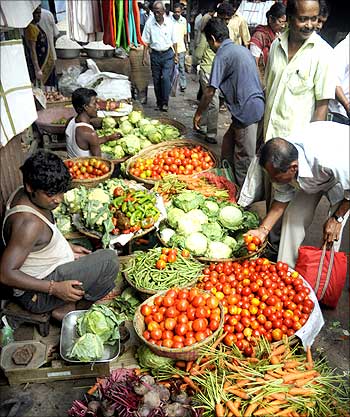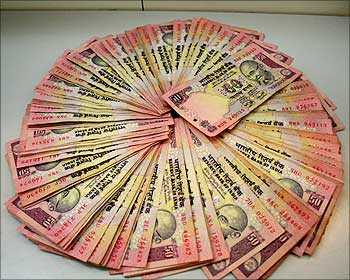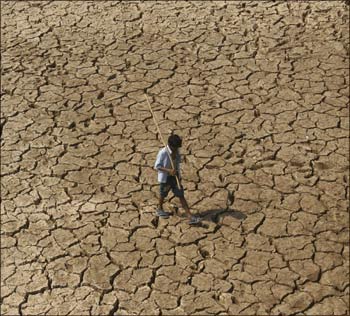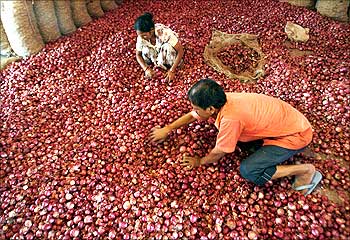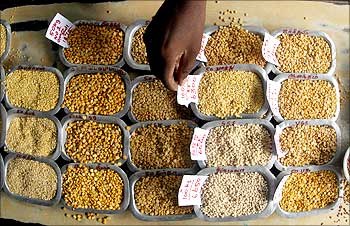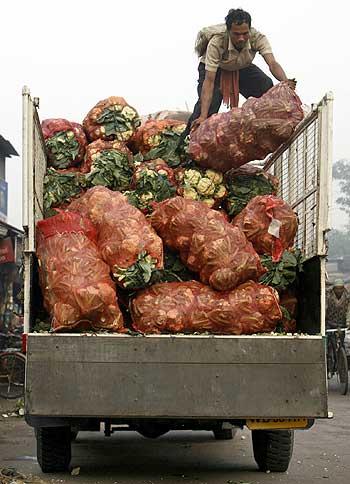 | « Back to article | Print this article |
Soaring prices: What can be done?
Skyrocketing prices have even the Supreme Court worried.
On Tuesday, the Apex Court expressed concern over the spiralling prices of food items that have hit the common man hard.
It has asked the Centre and the state governments to extend all possible financial, administrative and technical help to an expert government committee to recommend measures to overcome water crisis in the country caused by a weak monsoon.
Soaring prices: What can be done?
Even as India struggles to recover from the impact of global economic crisis, it faces another knotty issue: price rise.
The ever-increasing prices of food and other essential items have put a tremendous strain on the common man.
Prices of all vegetables, groceries and fruits have soared to double of what they cost a year ago.
Even as the government claims that inflation is down, the prices of food and other essential items just refuse to come down.
With the government increasing in fuel prices -- by Rs 4 a litre on petrol and Rs 2 diesel) -- food prices shot up even further.
The other major reason for the price rise is more demand and less supply.
Before you read on further, take some time to think what according to you are the causes for this BIG price rise? Is it inadequate monsoons? Or is it hoarding? What do you think can be done to check price rise? Please write your opinions on the discussion board below.Soaring prices: What can be done?
Retail prices surge 32% in June-July
Retail food prices have surged up to 32 per cent in the country after the south-west monsoon hit India in the last week of May with poor rain compounding the problem, adding to consumer worries.
The monsoon runs from June to September in the country. To date, there is 28 per cent deficit in rainfall (against the long-period average of 89 cm).
The India Meteorological Department has downgraded its forecast for August to 87 per cent from 93 per cent after the country observed a dry spell during the first ten days of this month.
In June-July, consumers have seen an enormous rise in prices of varieties of pulses most in demand, sugar, groundnut oil, tea and potato, according to analysis of 14 essential commodities collated by the ministry of consumer affairs.
The rise in prices of food items in June and July this year has been up to 32 per cent, as compared to 18 per cent in the corresponding period in 2008, the data showed.
The prices of these essential items shot up significantly as rain in key growing states became weaker by the end of July.
The retail price of tur, ruling at Rs 62 a kg in June, rose to Rs 82 a kg by the end of July. At present, tur has skyrocketed to about Rs 90 a kg in many places across the country, the data showed.
Chana dal (split chick peas), which was going at Rs 47 a kg in June in Kerala, now cost Rs 56 a kg by July-end. Potato prices have also gone up to Rs 22 a kg, while tea rates have climbed to Rs 290 a kg as on July 31.
Edelweiss Securities recently said in a research report that the weak monsoon would exert further upward pressure on prices of primary articles.
"Rainfall deficiency has been all the more pronounced over North East and North West India -- both important from the point of view of foodgrain production," it said.
Besides the government-tracked commodities, the prices of vegetables have become expensive in the retail markets during the review period.
According to housewife Sarita Verma in Delhi, "Vegetables are unaffordable these days. Before June, some veggies like ladies finger and bitter gourd were available at Rs 25 a kg, but are now ruling at Rs 40 a kg."
Even a vegetable seller at Bhogal in south Delhi expressed similar views about rising dal prices, "Tur dal has become so expensive that I have stopped buying it."
Soaring prices: What can be done?
Inflation negative, but
Inflation is calculated using a basket of hundreds of common items. The price increase is then multiplied by their weightage or their relative importance as a percentage of consumer spending.
As many as 435 commodities in India form a part of this 'basket'. Data on the price level of each of these commodities is tracked through the Wholesale Pr ice Index which is an indicator of movement in prices of commodities in all trade and transactions.
This is also the price index which is available on a weekly basis with the shortest possible time lag only two weeks. The Indian government has taken WPI as an indicator of the rate of inflation in the economy.
But prices of different items rise at different rates. So if items of higher weightage cost less (showing low inflation) and certain other items (of lower weightage, like vegetables) cost more, the overall inflation rate will be reflected as low. However, you will end up pay more for the vegetables despite inflation rate being low.
Soaring prices: What can be done?
PM to convene chief ministers' meet
Acknowledging that the situation regarding prices of food items is serious, the government said on Friday it was taking long and short term measures and Prime Minister Manmohan Singh will soon convene a meeting of chief ministers to address the problem.
Singh will probably meet the chief ministers on August 17 to specifically focus on measures to curb hoarding in the backdrop of reports of blackmarketing because of shortage of supplies.
The government also convened a meeting of state chief secretaries recently to discuss the issue of rising prices and the steps being taken to control hoarders and blackmarketeers.
Soaring prices: What can be done?
Addressing the water crisis is important
The Centre told the court on Monday that it was exploring utilisation of sea water as one of the alternative means for meeting acute water crisis that has gripped the country in recent years.
To overcome these problems and chalk out a long-term solution, a strategy christened 'WAR for water' (winning, augmentation and renovation for water) has been formulated with a 23-member technical experts committee headed by Ramasami as chairperson, the Centre said in an affidavit filed through the Department of Science and Technology.
Under 'WAR', problems associated with water like availability, quality, indiscriminate use, renovation for recycles, augmentation of quality water from available and accessible sources would be taken up, it said.
The affidavit has been filed in response to an April 28 direction of the apex court on the PIL filed by an advocate M K Balakrishnan.
